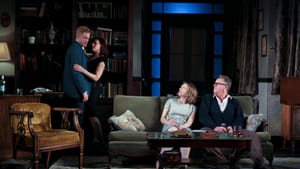Stay in the Loop
BSR publishes on a weekly schedule, with an email newsletter every Wednesday and Thursday morning. There’s no paywall, and subscribing is always free.
Fun and games in academe
'Who's Afraid of Virginia Woolf?' by Theatre Exile (second review)

When you enter George and Martha’s living room, you know “it’s going to be a bumpy night,” as Bette Davis says in 1950's All About Eve. And a bumpy night it is. You are about to spend three hours with some of the smartest, nastiest people imaginable, and the better the actors, the more devastating the experience. The night you spend with the cast of Theatre Exile’s production of Edward Albee’s Who’s Afraid of Virginia Woolf? is devastating indeed.
It’s 2 a.m. and George (played with haunting despair by Pearce Bunting) and Martha (Catharine Slusar), with her braying laugh and sharp wit, are coming home slightly drunk from one of those excruciating evenings common in academe — dinner with the faculty. Martha’s father is president of the small New England college where George professes history, but the evening is just getting started. Martha has invited Nick (Jake Blouch), a newly appointed biology professor, and his ever-so-sweet wife Honey (Emilie Krause) over for drinks.
And so the games begin, starting with “Humiliate the Host.”
George and Martha love to hate each other, love to tear each other into little shreds, and yet would be utterly lost without each other. “He makes me happy,” Martha says, “And I do not want to be happy.” And so she will do anything to keep both of them locked in an eternal battle, with anyone unlucky enough to be in their vicinity as collateral damage.
The fights between George and Martha are like The Hunger Games, a take-no-prisoners battle in which the weapons are words and stories and old regrets and failure, and the consequences can be life and death. “What a dump,” Martha proclaims, referring to her home, and perhaps her life. (It’s another not quite remembered Bette Davis quote, from a 1949 film called Beyond the Forest, which Martha couldn’t remember even if she were sober.)
And for her, everything is a dump or a failure and she can’t let anyone forget what might have been.
Revisiting old grievances
All the little things that drive wedges between couples are brought up again and again. He’s six years younger than she is. It was an approved marriage, and started out fairly well, but then things fell apart. “Good, better, best, bested,” George announces, proud of his wit, the only weapon he has left.
Martha uses words and her body, her “pointless infidelities,” to get at George. An exchange between Nick and Martha is a dance and a duel, and George is forced to watch. He retaliates with snapdragons and saccharinity, and she is out to destroy him again.
Honey seems the sweetest, caught up in a game beyond her ken, but she has her own way of controlling things. “Never mix, never worry,” she says as if simplicity is the answer as she downs brandy after brandy, then vomits discreetly in the offstage bathroom. Nick is smug and judgmental, feeling superior to his elders, yet falling into their games because he wants so much to be accepted. Absent children also people the stage: a boy who kills his parents, a hysterical pregnancy, a birthday boy.
The play is about the regretted past, the might-have-beens, and an illusory future. George is a history professor, well-versed in the past, but his own future is uncertain. Nick wants to be that future, the head of the department, but his machinations, “plowing pertinent wives,” seems doomed to failure as well.
Is this feminism?
Albee is one of the few playwrights writing roles for women of a certain age (consider A Delicate Balance, Three Tall Women). Yet these aren’t women anyone wants to be. If this is, as some say, a feminist example of what happens to women who play by or subvert traditional roles, it is as depressing as Thelma & Louise without a cliff to drive over. Martha drowns her frustration in booze and fantasy. Honey plays the game of dutiful wife — she would be the one standing by her disgraced husband in front of the cameras. What is lacking is the sense of what a positive strong woman might be. Does Albee even know?
I’ve encountered Martha many times as an acting student — she’s one of the few roles for women who are no longer ingénues — but each time I am put off by her anger, her drunkenness, her unrelenting meanness. Aren’t there other choices, I keep asking.
But those are not problems with this production. The acting was solid throughout, which is what makes this such a shattering performance. Bunting and Slusar are relentless, barely stopping to reload their weapons before they find a new way to get at each other. Even when Blouch and Krause sit silently at the mercy of their tormenters, they are fully present, watching the wreck on the highway, unable to look away, unable to get away — like us in the audience, voyeurs watching an unhappy marriage take its last breath. We know too much about abusive relationships and addiction these days to see any hope for either couple, yet we hang in there and leave wanting a good stiff drink.
For a review by Kathryn Osenlund, click here.
What, When, Where
Who’s Afraid of Virginia Woolf? By Edward Albee. Joe Canuso directed. Presented by Theatre Exile. Through May 17, 2015 at the Plays & Players Theater, 1714 Delancey Place, Philadelphia. 215-218-4022 or www.theatreexile.org.
Sign up for our newsletter
All of the week's new articles, all in one place. Sign up for the free weekly BSR newsletters, and don't miss a conversation.

 Naomi Orwin
Naomi Orwin